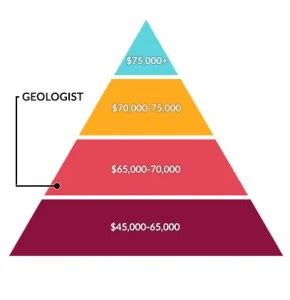Are you passionate about unraveling the mysteries of the Earth and considering a career in geology? Not only is geology a fascinating field that allows you to explore the Earth’s treasures, but it also offers the potential for a substantial income. In this blog post, we will delve into the world of geology salaries, shedding light on what you can expect to earn in this field and the factors that influence your earning potential.
From the highest paying geology jobs to the impact of experience on geology salaries, we will cover it all. We will also explore how different industries can affect geology salaries, comparing them to other STEM careers. Whether you’re just starting out in the field or looking to increase your geology salary, we’ll provide you with valuable insights and tips on how to achieve your income goals while pursuing your passion for geology. So, let’s uncover the geology salary scale and find the perfect balance between income and passion in your geology career.
Table of Contents
What are geology salaries like?
Geology salaries can vary widely depending on a number of factors, including level of education, experience, and the specific industry in which a geologist works. Salaries in the field of geology can range from entry-level positions to senior-level roles, with a big difference in pay between the two.
While some geologists may start out earning a modest salary, those who advance in their careers and gain more experience can command much higher salaries. Factors such as the demand for geological expertise in a particular region or sector can also play a significant role in determining salaries.
Some of the highest paying jobs in geology can be found in the oil and gas industry, where geologists are often tasked with identifying and assessing potential drilling sites. In contrast, entry-level roles in environmental consulting or government agencies may not offer the same lucrative salaries.
Overall, geology salaries are influenced by a mix of factors, including experience, industry, and demand for geological skills. It’s important for aspiring geologists to consider these variables when evaluating potential career paths and salary expectations.
Factors that influence geology salaries
Geology salaries can be influenced by a variety of factors, including education, experience, location, and industry. Individuals with advanced degrees such as a Master’s or PhD in geology can often command higher salaries than those with only a Bachelor’s degree. Additionally, gaining experience through internships, fieldwork, and research projects can also contribute to higher earning potential in the field of geology.
Location is another important factor that can impact geology salaries. Salaries for geologists can vary widely depending on the cost of living in a particular area, as well as the demand for geologists in that region. For example, geologists working in urban areas or regions with a high concentration of natural resources may command higher salaries compared to those working in rural or less economically developed areas.
Furthermore, the industry in which a geologist works can also have a significant impact on their salary. For instance, geologists working in the energy sector, particularly in oil and gas exploration and production, tend to earn higher salaries compared to those working in environmental consulting or academia. The demand for geologists in specific industries, the level of competition, and the financial health of the industry can all influence salary levels.
In conclusion, there are several factors that can influence geology salaries, including education, experience, location, and industry. Understanding these factors can help geologists make informed decisions about their career paths and potential earning potential in the field of geology.
Highest paying geology jobs
When it comes to the field of geology, there are several lucrative career paths that individuals can pursue. One of the highest paying jobs in geology is that of a Petroleum Geologist. Petroleum Geologists are responsible for evaluating the potential for oil and gas deposits in rock formations. They utilize their knowledge of geology to interpret seismic data, map out potential drilling sites, and make recommendations for extraction processes. Because of the high demand for oil and gas, Petroleum Geologists are often able to command high salaries.
Another high-paying job in the geology field is that of a Mining or Geological Engineer. These professionals are involved in developing and designing mines and monitoring the mining process. They also play a crucial role in ensuring the safety and efficiency of mining operations. Mining and Geological Engineers often work for mining companies, consulting firms, or government agencies. Their expertise in geology and engineering allows them to earn substantial incomes.
Geophysicists are also among the highest paid professionals in the field of geology. These individuals specialize in studying the physical properties of the Earth’s crust and mantle. They use various methods, including seismic imaging and remote sensing, to gather data about the Earth’s subsurface. Geophysicists work in industries such as oil and gas exploration, environmental consulting, and research institutions. Their advanced knowledge and skills in geophysics make them highly sought after, leading to competitive salaries.
Lastly, a career as a Reservoir Engineer is another high-paying option for geologists. Reservoir Engineers are tasked with estimating the amount of oil and gas in underground reservoirs and devising strategies for extracting these resources. They work closely with Petroleum Geologists and other professionals in the energy industry. Due to the technical nature of their work and the importance of maximizing resource recovery, Reservoir Engineers are well-compensated for their expertise.
How to increase your geology salary
One of the most important factors in increasing your geology salary is to continue building your education and skills. Pursuing advanced degrees, certifications, and specialized training programs can make you more valuable to employers and therefore, increase your earning potential. Additionally, staying up to date with the latest technologies and industry trends can also help you stand out in the job market.
Networking is another crucial aspect of boosting your geology salary. Building and maintaining professional relationships with others in the industry can open doors to opportunities for higher-paying positions, promotions, and lucrative projects. Attending industry events, joining professional geology organizations, and engaging with colleagues on platforms like LinkedIn can help expand your network and expose you to new career prospects.
Another way to increase your geology salary is to consider pursuing opportunities in high-demand or niche areas of the field. Certain specializations, such as hydrogeology, petroleum geology, or environmental geology, can often command higher salaries due to their specific expertise. Researching the current job market and identifying areas with a high need for geology professionals can guide you toward more financially rewarding career paths.
Lastly, negotiating your salary and benefits can play a significant role in boosting your geology earnings. Being prepared to advocate for yourself during job interviews, performance reviews, or when considering new job offers can help ensure that you are compensated fairly for your skills and experience. Understanding industry salary benchmarks and knowing your own worth can empower you to confidently negotiate for the compensation package you deserve.
Geology vs. other STEM salaries
When considering a career in geology, many individuals may wonder how geology salaries compare to other STEM (Science, Technology, Engineering, and Mathematics) fields. While geology is a specialized field, it is important to examine the average salaries and job prospects in comparison to other STEM professions.
One of the primary factors to consider when comparing geology salaries to other STEM salaries is the level of education and experience required. Many geologists hold at least a bachelor’s degree, while other STEM fields may require advanced degrees such as a master’s or Ph.D. This difference in education level can significantly impact salary potential.
Another consideration is the demand for geologists and other STEM professionals in the job market. While some STEM fields may have a higher demand and therefore higher salaries, geology offers unique opportunities in environmental consulting, natural resource management, and energy exploration, which can also be financially rewarding.
Moreover, the geographical location can also play a significant role in determining salaries for geologists and other STEM professionals. Certain regions may offer higher salaries for geologists due to the demand for their expertise in the exploration and extraction of natural resources.
Exploring the geology salary scale
When it comes to geology salaries, there are several factors that come into play. A geologist’s salary can vary depending on their level of education, experience, and the industry they work in. While entry-level positions may offer a lower salary, those with higher levels of education and experience tend to earn more.
Another factor that greatly influences the geology salary scale is the location in which the geologist is employed. Salaries can vary based on the cost of living in a particular area, as well as the demand for geologists in that region. For example, geologists working in oil-rich areas may earn higher salaries compared to those working in less lucrative regions.
It’s important to note that the amount of fieldwork and travel required for certain geology jobs can also impact salary. Geologists who are willing to spend long periods working in remote areas may receive additional compensation compared to those working in more urban environments.
Overall, the geology salary scale is influenced by a variety of factors including education, experience, industry, location, and job requirements. By understanding these influences, geologists can make informed decisions about their careers and take steps to increase their earning potential.
Impact of experience on geology salaries
Experience plays a significant role in determining geology salaries. As geologists gain more experience in the field, their expertise and knowledge increase, leading to higher pay. With years of experience, geologists are able to take on more complex projects and responsibilities, which in turn result in higher compensation.
Employers often value experience highly and are willing to pay more for geologists who have a proven track record in the industry. Additionally, experienced geologists are often sought after for their ability to make critical decisions and provide valuable insights, making them more valuable to companies and organizations.
It’s important for aspiring geologists to understand the impact that experience can have on their salary potential. Working on various projects, gaining field experience, and increasing their expertise are all ways for geologists to increase their pay as they progress in their careers.
In conclusion, the impact of experience on geology salaries is substantial. As geologists gain more experience and knowledge, they are well-positioned to command higher pay and take on more lucrative opportunities within the field.
Top countries with high geology salaries
When it comes to pursuing a career in geology, it’s essential to consider the potential salary and job opportunities in different countries. Geology salaries can vary greatly depending on the country, with some offering higher pay and better benefits for geologists. Understanding the top countries with high geology salaries can help geologists make informed decisions about their career paths.
One of the top countries with high geology salaries is the United States. In the US, geologists can expect competitive salaries, especially in states with active mining, oil, and gas industries. The demand for geologists in sectors such as environmental consulting and engineering also contributes to the high salaries offered in the country.
Australia is another country known for providing high salaries to geologists. With its abundance of natural resources and booming mining industry, Australia offers lucrative opportunities for geologists. The country’s strong economy and demand for skilled geologists make it an attractive destination for those seeking high-paying geology jobs.
Canada is also recognized for its high geology salaries, particularly in provinces rich in mineral resources such as Ontario and Alberta. The country’s vast mineral reserves and exploration projects create a constant demand for geologists, leading to competitive salaries and ample job opportunities.
How different industries affect geology salaries
Geologists work in a variety of industries, each with its own unique set of factors that can affect salaries. The industry in which a geologist works can have a significant impact on their earning potential. For example, the oil and gas industry tends to offer some of the highest salaries for geologists, as these professionals are crucial in the exploration and extraction of natural resources.
On the other hand, geologists working in environmental consulting or government agencies may often earn lower salaries compared to their counterparts in the oil and gas sector. This is due to the differences in demand, responsibilities, and financial resources within these industries.
Furthermore, the geographical location of the industry can also play a role in determining geology salaries. For instance, geologists working in regions with high natural resource production may command higher salaries, while those in areas with less demand for geological expertise may see lower pay.
Ultimately, the industry in which a geologist is employed can have a substantial impact on their earning potential, and understanding the various factors at play is crucial for those seeking to maximize their income in this field.
Balancing passion and income in geology careers
When pursuing a career in geology, it’s important to find a balance between following your passion for the field and earning a comfortable income. Geology is a fascinating and rewarding profession that allows individuals to study the Earth’s processes, natural resources, and environmental impacts. However, like many careers in the STEM field, the income potential can vary based on a variety of factors.
One of the key factors that influences geology salaries is the level of education and experience. Geologists with advanced degrees and years of experience in the field typically command higher salaries, as they have developed specialized skills and knowledge that are in high demand. Additionally, the industry in which a geologist works can greatly impact their income potential. For example, geologists in the oil and gas industry often earn higher salaries due to the high demand for their expertise and the nature of the work.
For individuals passionate about geology but concerned about income potential, it’s important to carefully consider the industry and specialization within the field. Balancing passion and income in geology careers may involve exploring different opportunities and seeking out positions that offer both fulfillment and financial stability. It’s also worth noting that the geographical location can play a significant role in geology salaries, as certain regions may have higher demand for geologists and offer higher compensation.
Ultimately, finding a balance between passion and income in a geology career may require some flexibility and willingness to explore different paths within the field. By carefully considering the factors that influence geology salaries and seeking out opportunities that align with both professional interests and financial goals, individuals can pursue rewarding and fulfilling careers in geology.






